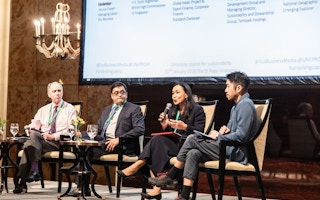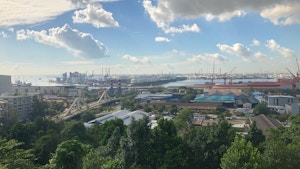Can Asia unleash the capital needed to avoid dangerous climate change?
To continue reading, subscribe to Eco‑Business.
There's something for everyone. We offer a range of subscription plans.
- Access our stories and receive our Insights Weekly newsletter with the free EB Member plan.
- Unlock unlimited access to our content and archive with EB Circle.
- Publish your content with EB Premium.
That was the main topic of discussion at the Unlocking Capital for Sustainability event in Singapore on Tuesday, which was held four months after a report from the Intergovernmental Panel on Climate Change warned that the world has about a decade to dramatically reduce carbon emissions or face the most dire consequences of global warming.
According to a report by DBS Bank and UN Environment on Green Finance Opportunities in the Association of Southeast Asian Nations (Asean), an estimated US$200 billion of green investment is needed annually from 2016 to 2030 in this region alone to tackle climate change.
“Climate change is no longer a distant threat on the horizon, but one that is near and present,” said Masagos Zulkifli, Singapore’s Minister for the Environment and Water Resources, in the opening address at the event organised by Eco-Business and UN Environment. “It is a long-term issue that will require the commitment of governments, investors, businesses and consumers.”
Referring to how the Earth has already warmed by one degree Celsius above pre-industrial levels, and is likely to reach 1.5 degrees Celsius between 2030 and 2052 if further action is not taken today, Masagos warned that Singapore is feeling the effects too.
According to a new report from the Meteorological Service Singapore (MSS), 2018 was the joint eighth warmest year on record, despite an extended cool spell in January.
“More worryingly, the last decade from 2009 to 2018 was Singapore’s warmest decade, a sign of a long term warming trend,” Masagos said.
“
Climate change is no longer a distant threat on the horizon, but one that is near and present.
Masagos Zulkifli, Minister for Environment and Water Resources, Singapore
The event, which convened over 130 finance leaders, investors and entrepreneurs at the St Regis Hotel, was held in the run up to the third session of UN Environment’s Forum of Ministers and Environment Authorities of Asia Pacific, which is taking place until 25 January in Singapore.
Singapore must set Asean’s green financing standard
As a conduit for financial flows into Asia, the lending and investment decisions taken by financial institutions based in Singapore will have a major impact on the region’s contribution to a 1.5-degree world and its climate resilience.
More investors in Singapore are waking up to sustainable finance challenge. A Standard Chartered Private Bank survey found that 64 per cent of Singapore investors were highly motivated to do good while earning a profit.
Unlocking capital for sustainability from Eco-Business on Vimeo.
Masagos praised green investing, and encouraged financial institutions to continue contributing to the design and development of new environmental, social and governance (ESG)-related products that the global economy will need to achieve sustainable development.
He also talked about the role platforms play in managing sustainability, through the launch of WWF’s Asia Sustainable Finance Initiative (ASFI) earlier this month. ASFI is a multi-stakeholder platform, bringing together academia, industry and science-based resources to facilitate cross-sectoral sharing to develop, promote and coordinate sustainable finance initiatives in the region. Such platforms not only allow businesses to grow and broaden their revenue stream, but accelerate Singapore’s transition to a low-carbon economy.
The quiet revolution is getting louder
Jessica Cheam, managing editor of Eco-Business noted in her welcome address that the finance industry had undergone significant change since the financial crisis a decade ago. “Today I’d like to think we are seeing a radically different finance industry demonstrating a clear commitment to the role finance plays to a clean and clear future.”
Echoing Cheam’s sentiments, Steven Stone, chief of resources and markets branch of the UN Environment, said: “If we leave some people behind, we are not achieving sustainability.”
Stone said that green finance has a big opportunity for growth. “Green bonds amounted to over US$100 billion in 2018, but are still a very small part of the financial market,” he said.
“It’s possible now to radically change our economies and harness opportunities that are out there in the circular economy,” said Stone. “Complex issues require complex solutions with more than one party. It depends on you and all of us.”
Future-proofing finance
Esther An, chief sustainability officer of real estate giant City Developments Limited, shared in a fireside discussion how sustainability reporting can grow sustainable finance, and talked about the importance of strategy in improving business and lowering carbon footprints.
“Investors want to invest in companies that can future proof to challenges,” An said. “The future is about survival and whether you can sustain long-term goals.”
Fang Eu-Lin, partner at PwC Singapore, who moderated the discussion, added the importance of climate change scenario analysis in preparing businesses the impact of climate change.
Organisations need to adopt robust sustainability reporting to support green financing vehicles such as green loans and ESG green loans, she said.
Eu-Lin warned that organisations that lack this type of reporting muscle will run into difficulties. “I urge organisations to start earlier, and have a better understanding of how sustainability can open up growth and investment,” she said.
“
We are all part of the problem, but we are all part of the solution.
Barney Swan, managing director, The ClimateForce Challenge
Finance as the engine for change
Neo Gim Huay, managing director of Enterprise Development Group at investment firm Temasek Holdings, was cautiously optimistic about the future of green finance. In the opening plenary session, she noted that allocations in green finance had accelerated seven-to-ten-fold over the last five years.
Neo suggested financiers invest in start-ups that position themselves to solve the challenges that cater to demand, referring to Temasek Holdings’ recent investment in Impossible Foods, a California-based plant-based meat alternative company.
Surya Bagchi, global head of project and export finance at Standard Chartered, said he believed that the key to combatting climate change is collaboration. “If we collaborate effectively we can rise to the challenge,” he said.
Among the highlights of the event was an address from Barney Swan, one of the youngest people to traverse Antarctica. In a 100 per cent renewable energy-powered expedition, the 23 year-old walked 1,000 kilometres over 65 days to the South Pole in December 2017, using NASA designed solar ice-melters, lithium batteries powered by biofuels.
According to Swan, as a species we omit 360 to 400 million tonnes of carbon dioxide into the atmosphere every day. Swan’s ClimateForce challenge is a seven-year mission to reduce 360 million tonnes of CO2 by 2025.
Swan warned of the need to make more risks for the sake of our species’ extinction. “We all have to step up our game. We have choice, we have freedom. We are all part of the problem, but we are all part of the solution.”





















